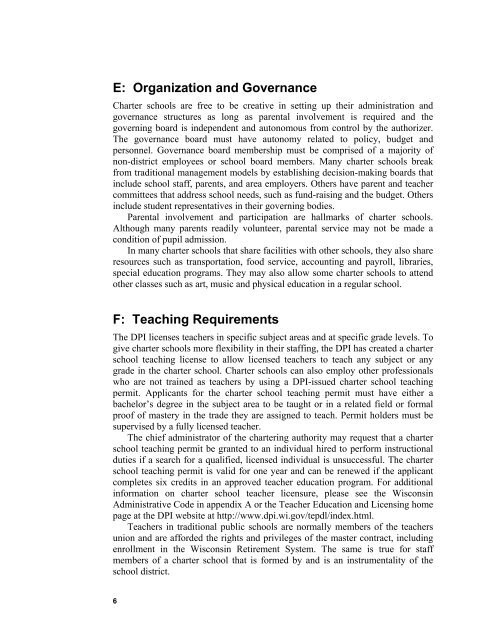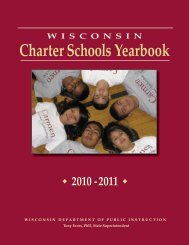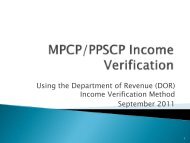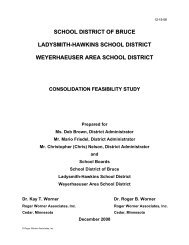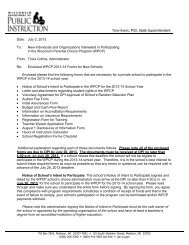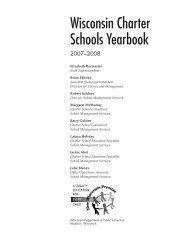2009-10 Yearbook - School Management Services
2009-10 Yearbook - School Management Services
2009-10 Yearbook - School Management Services
Create successful ePaper yourself
Turn your PDF publications into a flip-book with our unique Google optimized e-Paper software.
E: Organization and Governance<br />
Charter schools are free to be creative in setting up their administration and<br />
governance structures as long as parental involvement is required and the<br />
governing board is independent and autonomous from control by the authorizer.<br />
The governance board must have autonomy related to policy, budget and<br />
personnel. Governance board membership must be comprised of a majority of<br />
non-district employees or school board members. Many charter schools break<br />
from traditional management models by establishing decision-making boards that<br />
include school staff, parents, and area employers. Others have parent and teacher<br />
committees that address school needs, such as fund-raising and the budget. Others<br />
include student representatives in their governing bodies.<br />
Parental involvement and participation are hallmarks of charter schools.<br />
Although many parents readily volunteer, parental service may not be made a<br />
condition of pupil admission.<br />
In many charter schools that share facilities with other schools, they also share<br />
resources such as transportation, food service, accounting and payroll, libraries,<br />
special education programs. They may also allow some charter schools to attend<br />
other classes such as art, music and physical education in a regular school.<br />
F: Teaching Requirements<br />
The DPI licenses teachers in specific subject areas and at specific grade levels. To<br />
give charter schools more flexibility in their staffing, the DPI has created a charter<br />
school teaching license to allow licensed teachers to teach any subject or any<br />
grade in the charter school. Charter schools can also employ other professionals<br />
who are not trained as teachers by using a DPI-issued charter school teaching<br />
permit. Applicants for the charter school teaching permit must have either a<br />
bachelor’s degree in the subject area to be taught or in a related field or formal<br />
proof of mastery in the trade they are assigned to teach. Permit holders must be<br />
supervised by a fully licensed teacher.<br />
The chief administrator of the chartering authority may request that a charter<br />
school teaching permit be granted to an individual hired to perform instructional<br />
duties if a search for a qualified, licensed individual is unsuccessful. The charter<br />
school teaching permit is valid for one year and can be renewed if the applicant<br />
completes six credits in an approved teacher education program. For additional<br />
information on charter school teacher licensure, please see the Wisconsin<br />
Administrative Code in appendix A or the Teacher Education and Licensing home<br />
page at the DPI website at http://www.dpi.wi.gov/tepdl/index.html.<br />
Teachers in traditional public schools are normally members of the teachers<br />
union and are afforded the rights and privileges of the master contract, including<br />
enrollment in the Wisconsin Retirement System. The same is true for staff<br />
members of a charter school that is formed by and is an instrumentality of the<br />
school district.<br />
6


